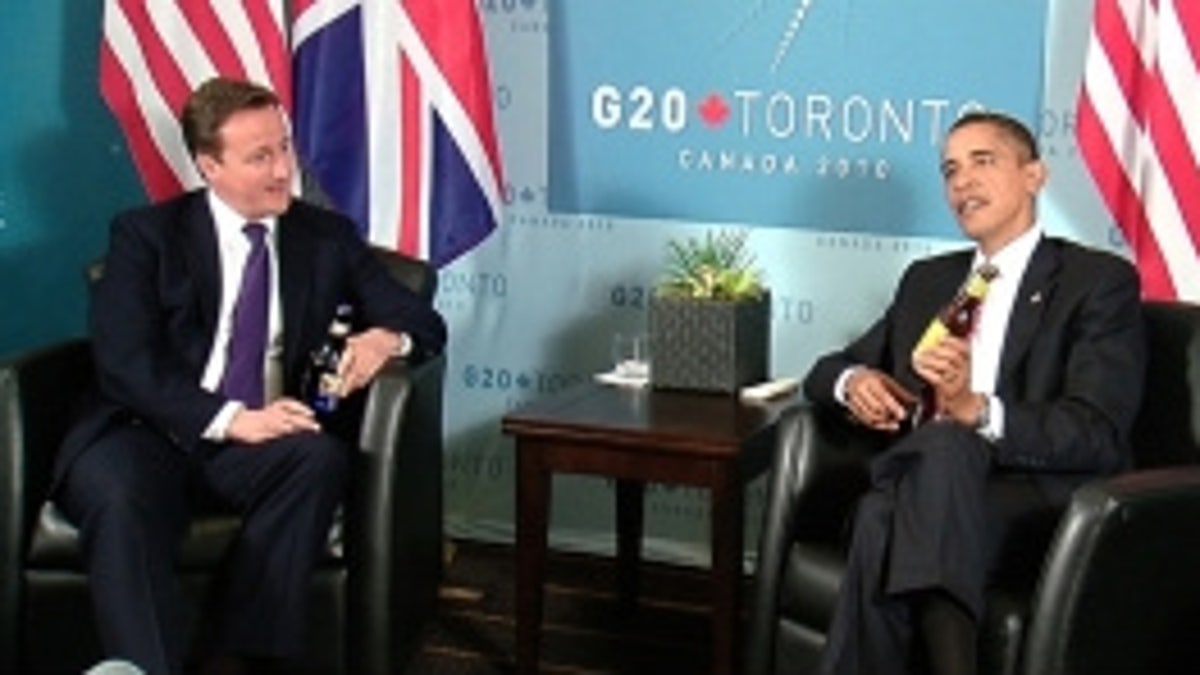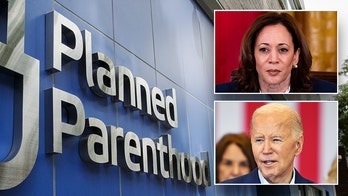
President Obama and British Prime Minister David Cameron exchange beers following a World Cup bet, June 26, 2010 (White House Photo)
In an effort to defuse what will likely be the biggest point of contention in their Tuesday White House meeting, British Prime Minister David Cameron is expected to tell President Obama that the release of convicted Pan Am Flight 103 bomber Abdel Baset al-Megrahi was "wrong." In their first White House meeting, the two leaders are also expected to discuss Afghanistan, British Petroleum’s handling of the oil spill in the Gulf and BP’s alleged role in the release of al-Megrahi.
In an interview with BBC news, Mr. Cameron, who was elected Prime Minister in May, said he "deeply regrets" the pain the decision caused but asserted that the release of al-Megrahi in August of last year was the decision of the Scottish government alone. "All I know is, as leader of the opposition, I could not have been more clear that I thought the decision to release al-Megrahi was completely and utterly wrong," be told the BBC.
Al-Megrahi was convicted in 2001 and sentenced to life in prison for his role in the December 1988 bombing which killed 259 people on board and 11 people on the ground in Lockerbie, Scotland. al-Megrahi, who suffered from prostate cancer, was released in August 2009 by Scottish officials on "compassionate grounds" after he was given only 3 three-months to live. Al-Megrahi received a hero’s welcome when he returned to his native Libya - where he is still living - almost one year later.
Just as British owned BP sealed the oil leak in the Gulf of Mexico, the company came under fire again, but this time for allegations that BP - which has lucrative oil contracts in Libya - lobbied the British government in 2007 to proceed with a UK-Libya prisoner transfer agreement. BP has acknowledged it warned the Labour government (Tony Blair was Labour's PM until June of 2007 when Gordon Brown came in) of a possible "negative impact on UK commercial interests," but denies there were any discussions with either the UK or Scottish government about al-Megrahi.
British Foreign Secretary William Hague said Saturday there was no evidence BP had any connection with al-Megrahi's release, but there is little doubt Prime Minister Cameron, who travels to Capitol Hill for meetings with House and Senate leadership Tuesday, will be peppered with BP questions. Just last week New York Democratic Senator Chuck Schumer called on the company to suspend oil drilling plans in Libya until the company's role in the release of al-Megrahi is investigated.
"The bottom line is simple: If it walks like a duck and quacks like a duck, then it just might be a corrupt deal between BP, the British government, and Libya." said Schumer, who lost numerous constituents in the Pan Am bombing, which was headed from London to New York's JFK airport December 21, 1988.
"Back in 2007, BP and the Libyan government struck a $900 million oil deal that the prime minister, Tony Blair, helped coordinate, said Schumer in a news conference with reporters. "But the deal ran into roadblocks, and BP admits that it pushed the British government to expedite a prisoner exchange agreement with Libya to smooth the way for an oil deal. We then know that the British government agreed to release al- Megrahi based on a fraudulent doctor's prognosis that he only had three months to live. All of a sudden, once Megrahi is released, all the roadblocks to that oil deal are removed and, lo and behold, the oil deal is finally approved. If anyone thinks this is a coincidence, I have them a bridge to sell them in Brooklyn," the senior senator from New York charged.
Schumer released a statement Tuesday morning saying that Cameron had agreed to a meeting with the New York and New Jersey senators. The meeting will take place at the British ambassador's residence Tuesday night.
"We are glad the Prime Minister has agreed to meet with us. We plan to ask him to have the UK do a complete investigation and bring al-Megrahi back to justice," Schumer said in a statement.
In his interview with BBC Cameron said on the topic, "I have no idea what BP did. I am not responsible for BP."
But BP and the oil spill the in the gulf have strained relations between the US and UK since the Deepwater Horizon rig explosion April 20th. And as British prime minister, Cameron has had to lead the defense of the British owned company amid harsh criticism from the American government and its citizens affected by the spill. June was an especially tough month for relations. As tens of thousands of barrels of oil continued to spill into the Gulf, President Obama, who early on in the environmental disaster referred to the company as "British Petroleum", said he would have fired BP's CEO Tony Hayward, embraced the idea that the oil company suspend its quarterly dividend and criticized BP for spending money on a PR campaign.
The angry words from Washington produced a backlash in the UK, where millions of British retirees depend on BP, the world's third-largest oil company, for their pensions. And Cameron had promised to press Mr. Obama during their one-on-one first meeting during the G8/G20 in Toronto, for a dollar amount so BP would have an idea of the final costs related to the oil spill. No such request was made, at least publicly.
Relations between the two countries seem to have simmered since Hayward was pulled from handling the oil spill day to day operations, and President Obama sat down with BP Chairman Carl-Henric Svanberg. The administration's meeting with BP executives in June led to the company's announcement of a $20 billion escrow fund over 4 years, to pay claims to Gulf Coast residents and business owners affected by the spill. Following the four hour meeting with senior administration officials, the chairman also announced the suspension of dividend payments to shareholders and the creation of a $100 million fund to assist out of work oil workers following the government's six month moratorium on deepwater drilling.
Tuesday's Oval Office meeting will be the second time the two world leaders are meeting, the first time in the US. White House Press Secretary Robert Gibbs says of all topics to be discussed, Afghanistan tops the US's list of priorities. There are now approximately 10,000 British troops in Afghanistan as part of the NATO led effort and the British have seen an increase in causalities as of late. The UK hopes to have withdrawn all its forces by 2015. Asked if Mr. Obama would try to dissuade Prime Minister Cameron from naming a target date, Gibbs said, "it is hard to look that far into the future. Obviously, the president has committed to July of 2011 as a date of our transition and begin to, based on -- judging that based on the conditions on the ground to begin removing some of the troops that -- that the president added as a part of our increased resources there over the past couple years."
Following their Oval Office sit down, Misters Obama and Cameron will participate in an East Room joint press conference. The events speak to the often described "special relationship" between the US and UK, but its a welcome Prime Minister Cameron's predecessor did not receive.
President Obama welcomed British Prime Minister Gordon Brown to the White House just six weeks after being sworn in himself, but the meeting between the President and the prime minister of one of the US's biggest allies was lack luster. Many Brits considered it a snub that Brown was only received for an Oval Office sit down meeting - no joint press conference in the East Room or Rose Garden as his predecessor Tony Blair frequently participated in during his tenure with former President George W. Bush. Of course Mr. Blair's relationship with Mr. Bush was questioned back at home with many charging Bush treated Mr. Blair as a "lap dog."
According to Heather Conley of Center for Strategic & International Studies, a think tank in Washington, in forging his relationship with this US president, Prime Minister Cameron needs to strike a balance between the perceived "subordinate, 'poodle' relationship" he had with President Bush, and Gordon Brown's "dour, technocratic approach."
"It remains to be seen if the two leaders will develop that "special" chemistry that has been historically evident between American and British leaders but appears to be somewhat elusive between President Obama and other world leaders," said Conley.
Conley adds Cameron should be given credit, after only two months on the job, for making some "gutsy political calls" like publicly apologizing for British actions related to the 1972 Bloody Sunday massacre in Northern Ireland; announcing a significant reduction in government spending as well as increasing taxes to reduce the UK's budget deficit; announcing that British forces will leave Afghanistan no later than 2015; and last, but certainly not least, politically navigating the fall-out over the BP oil spill in the Gulf of Mexico.
As part of his schedule while in the states, according the British Embassy, the prime minister will have breakfast with Vice President Biden, of course meet with President Obama, travel to the Hill for meetings with House and Senate leaderships, as well as have a sit down with Arizona Republican Senator John McCain.
Also on Tuesday, Cameron will have his first sit-down interview with a US television outlet since becoming Prime Minister - with ABC's Diane Sawyer.
On Wednesday, the Prime Minister will travel to Arlington National Cemetery to lay a wreath at the Tomb of the Unknown Soldier before proceeding to the Pentagon for military briefings on Afghanistan. He will then travel on to New York for meetings with US business leaders, and with UN Secretary-General Ban Ki Moon. He will also have dinner with the Mayor of New York, Michael Bloomberg.




